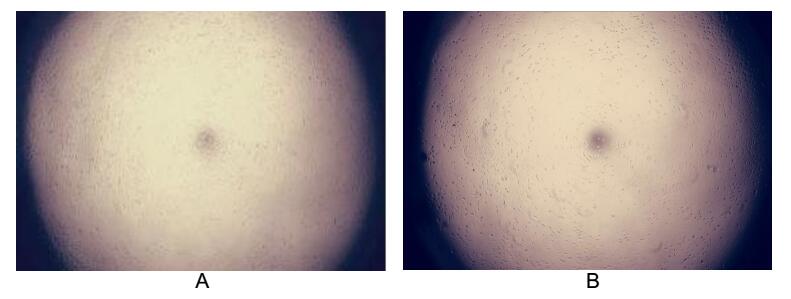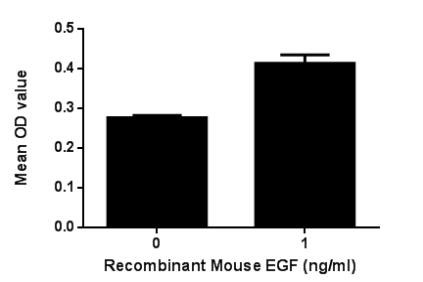Active Epidermal Growth Factor (EGF)
URG; Beta-Urogastrone; Pro-epidermal growth factor
- Product No.APA560Mu01
- Organism SpeciesMus musculus (Mouse) Same name, Different species.
- Buffer Formulation20mM Tris, 150mM NaCl, pH8.0, containing 1mM EDTA, 1mM DTT, 0.01% SKL, 5% Trehalose and Proclin300.
- TraitsFreeze-dried powder
- Purity> 95%
- Isoelectric Point6.3
- ApplicationsCell culture; Activity Assays.
- Download Instruction Manual
- UOM 10µg50µg 200µg 1mg 5mg
-
FOB
US$ 210
For more details, please contact local distributors!US$ 525
For more details, please contact local distributors! US$ 1050
For more details, please contact local distributors! US$ 3150
For more details, please contact local distributors! US$ 7875
For more details, please contact local distributors!
ACTIVITY TEST of the Active Epidermal Growth Factor (EGF)

Figure. Cell proliferation of 3T3 cells after stimulated with EGF.
Epidermal growth factor (EGF) binding to EGFR, results in cellular proliferation, differentiation, and survival. To test the effect of EGF on cell proliferation, 3T3 fibroblasts cells were seeded into triplicate wells of 96-well plates at a density of 2,000 cells/well and allowed to attach, replaced with serum-free overnight, then the medium was replaced with 1% serum standard DMEM prior to the addition of various concentrations of recombinant mouse EGF. After incubated for 96h, cells were observed by inverted microscope and cell proliferation was measured by Cell Counting Kit-8 (CCK-8). Briefly, 10µL of CCK-8 solution was added to each well of the plate, then the absorbance at 450nm was measured using a microplate reader after incubating the plate for 1-4 hours at 37℃. Proliferation of 3T3 cells after incubation with EGF for 96h observed by inverted microscope was shown in Figure 1. Cell viability was assessed by CCK-8 (Cell Counting Kit-8) assay after incubation with recombinant EGF for 96h. The result was shown in Figure 2. It was obvious that EGF significantly increased cell viability of 3T3 cells.
(A) 3T3 cells cultured in DMEM, stimulated with 1ng/mL EGF for 96h;
(B) Unstimulated 3T3 cells cultured in DMEM for 96h.

Figure. Cell proliferation of 3T3 cells after stimulated with EGF.
USAGE of the Active Epidermal Growth Factor (EGF)
Reconstitute in 20mM Tris, 150mM NaCl (pH8.0) to a concentration of 0.1-1.0 mg/mL. Do not vortex.
STORAGE of the Active Epidermal Growth Factor (EGF)
Avoid repeated freeze/thaw cycles. Store at 2-8°C for one month. Aliquot and store at -80°C for 12 months.
STABILITY of the Active Epidermal Growth Factor (EGF)
The thermal stability is described by the loss rate. The loss rate was determined by accelerated thermal degradation test, that is, incubate the protein at 37°C for 48h, and no obvious degradation and precipitation were observed. The loss rate is less than 5% within the expiration date under appropriate storage condition.
INCREMENT SERVICES
BCA Protein Quantification Kit
Molecular Mass Marker for Protein
Monoclonal Antibody Customized Service
Polyclonal Antibody Customized Service
Protein Activity Test Experiment Service
Electrophoretic Mobility Shift Assay (EMSA) Experiment Service
Buffer
Lentivirus Packaging Experiment Service
Adenovirus Packaging Experiment Service
Real Time PCR Experimental Service
Spike RBD Protein (S-RBD)
Protein G
Protein A
Related products
| Catalog No. | Organism species: Mus musculus (Mouse) | Applications (RESEARCH USE ONLY!) |
| RPA560Mu02 | Recombinant Epidermal Growth Factor (EGF) | Positive Control; Immunogen; SDS-PAGE; WB. |
| APA560Mu01 | Active Epidermal Growth Factor (EGF) | Cell culture; Activity Assays. |
| RPA560Mu01 | Recombinant Epidermal Growth Factor (EGF) | Positive Control; Immunogen; SDS-PAGE; WB. |
| PAA560Mu02 | Polyclonal Antibody to Epidermal Growth Factor (EGF) | WB; IHC; ICC; IP. |
| PAA560Mu01 | Polyclonal Antibody to Epidermal Growth Factor (EGF) | WB; IHC; ICC; IP. |
| SEA560Mu | ELISA Kit for Epidermal Growth Factor (EGF) | Enzyme-linked immunosorbent assay for Antigen Detection. |
| MEA560Mu | Mini Samples ELISA Kit for Epidermal Growth Factor (EGF) | Enzyme-linked immunosorbent assay for Antigen Detection. |
| SCA560Mu | CLIA Kit for Epidermal Growth Factor (EGF) | Chemiluminescent immunoassay for Antigen Detection. |
| LMA560Mu | Multiplex Assay Kit for Epidermal Growth Factor (EGF) ,etc. by FLIA (Flow Luminescence Immunoassay) | FLIA Kit for Antigen Detection. |

